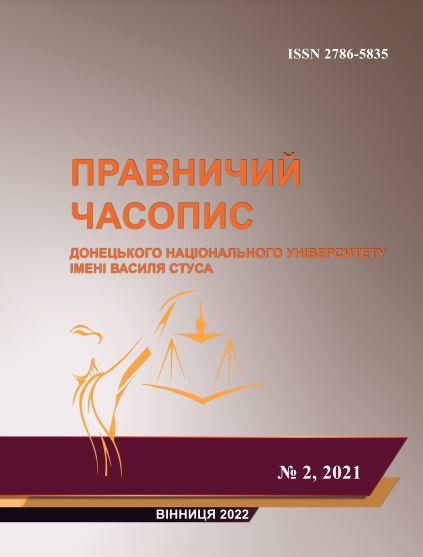Legal qualification of euthanasia worldwide
DOI:
https://doi.org/10.31558/2786-5835.2021.2.10Słowa kluczowe:
the right to life; euthanasia; Council of Europe law; the case-law of the European Court of Human RightsAbstrakt
Euthanasia has been a topical issue in both legal science and practice for several years now. Addressing the legalization or prohibition of euthanasia lies at the intersection of several areas, such as medicine, law and ethics. That is why it is pretty challenging to decide whether euthanasia is acceptable in a modern civilized society.
Every country in the world has its own approach to this area. Many states prohibit euthanasia, proclaiming the importance of the right to live. Some other states consider humanism and the deprivation of human suffering to be a more important value, allowing euthanasia. Some researchers hope for scientific and technological progress, emphasizing that many diseases that have not been treated before are curable. Therefore, in their opinion, the disease incurable today, can be cured tomorrow. At the same time, euthanasia deprives a person not only of suffering, but also of hope to become healthy in the future.
The Parliamentary Assembly of the Council of Europe calls euthanasia a violation of the human right to life. Instead, the European Court of Human Rights argues that there is no consensus in Europe yet. Accordingly, each state can decide whether to legalize or not euthanasia.
The paper analyzes the legislation of several countries on euthanasia and the law of the Council of Europe (PACE resolutions and the case-law of the European Court of Human Rights). It is concluded that there are four types of states in terms of their attitude to euthanasia: 1) allow both active and passive euthanasia; 2) allow only passive euthanasia; 3) prohibit both active and passive euthanasia; 4) do not regulate the issue of euthanasia in their legislation. It is also concluded that the formation of a pan-European standard of attitude to euthanasia is desirable.
Bibliografia
An act to add and repeal Part 1.85 (commencing with Section 443) of Division 1 of the Health and Safety Code, relating to end of life (End of Life Option Act) (2015) / California. Legislative Information. URL: https://leginfo.legislature.ca.gov/faces/billNavClient.xhtml?bill_id= 201520162AB15
Case of Afiri and Biddarri v. France (2018) / European Court of Human Rights HUDOC. URL: https://hudoc.echr.coe.int/eng?i=001-180588
Case of Glass v. the United Kingdom (2004) / European Court of Human Rights HUDOC. URL: https://hudoc.echr.coe.int/eng?i=001-61663
Case of Lambert and Others v. France (2015) / European Court of Human Rights HUDOC. URL: https://hudoc.echr.coe.int/eng?i=001-155352
Case of Oliver Leslie Burke v. the United Kingdom (2006) / European Court of Human Rights HUDOC. URL: https://hudoc.echr.coe.int/eng?i=001-76785
Case of Pretty v. the United Kingdom (2002) / European Court of Human Rights HUDOC. URL: https://hudoc.echr.coe.int/eng?i=001-60448
Chekhovska I. V., Bilousiuk V. V. Pravove rehuliuvannia evtanazii: mizhnarodnyi dosvid (Legal regulation of euthanasia: international experience). Mizhnarodnyi yurydychnyi visnyk: aktualni problemy suchasnosti (teoriia ta praktyka). 2019. № 14. P. 23–33 (in Ukrainian).
Civil Code of Ukraine from 16.01.2003 № 435-IV (in Ukrainian) / Legislation of Ukraine. URL: https://zakon.rada.gov.ua/laws/show/435-15
Code de la santé publique / Legifrance. URL: https://www.legifrance.gouv.fr/codes/section_lc/ LEGITEXT000006072665/LEGISCTA000006170991/?anchor=LEGIARTI000031971164#L EGIARTI000031971164
Convention for the Protection of Human Rights and Dignity of the Human Being with regard to the Application of Biology and Medicine: Convention on Human Rights and Biomedicine / Council of Europe. URL: https://rm.coe.int/168007cf98
Criminal Code Law of Turkey (2004) / WIPO. URL: https://www.wipo.int/edocs/lexdocs/ laws/en/tr/tr171en.pdf
Euthanasia Laws Act of Australia (1997) / Legislation of Australia. URL: https://www.legislation.gov.au/Details/C2004A05118
Guide on the decision-making process regarding medical treatment in end-of-life situations / Council of Europe. URL: https://rm.coe.int/CoERMPublicCommonSearchServices/ DisplayDCTMContent?documentId=090000168039e8c5
Miroshnychenko O. A. Evtanaziia ta pravo liudyny na zhyttia u mizhnarodnomu ta natsionalnomu pravi. (Euthanasia and the human right to life in international and national law). Forum prava. 2012. № 3. P. 459–464 (in Ukrainian).
Recommendation 1418 (1999) Protection of the human rights and dignity of the terminally ill and the dying / Parliamentary Assembly. URL: https://pace.coe.int/en/files/16722/html
Report «Euthanasia» (Doc. 9898), (2003) / Parliamentary Assembly. URL:https://assembly. coe.int/nw/xml/XRef/X2H-Xref-ViewHTML.asp?FileID=10255&lang=EN
Resolution 1859 (2012) Protecting human rights and dignity by taking into account previously expressed wishes of patients / Parliamentary Assembly. URL: http://assembly.coe.int/nw/xml/ XRef/Xref-XML2HTML-en.asp?fileid=18064&lang=en
Review procedures for the termination of life on request and assisted suicide and amendment of the Criminal Code and the Burial and Cremation Act (Termination of Life on Request and Assisted Suicide (Review Procedures) Act) (2002) / l’Institut Européen de Bioéthique. https://www.ieb-eib.org/ancien-site/pdf/loi-euthanasie-pays-bas-en-eng.pdf
Sartori D. End-of-life issues and the European Court of Human Rights. The value of personal autonomy within a ‘proceduralized’ review / Questions of International Law. URL: http://www.qil-qdi.org/end-life-issues-european-court-human-rights-value-personal-autonomywithin-proceduralized-review/
The Belgian Act on Euthanasia (2002) / End-of-Life Law and Policy in Canada. URL: http://eol.law.dal.ca/wp-content/uploads/2015/06/Euthanasia-Act.pdf

